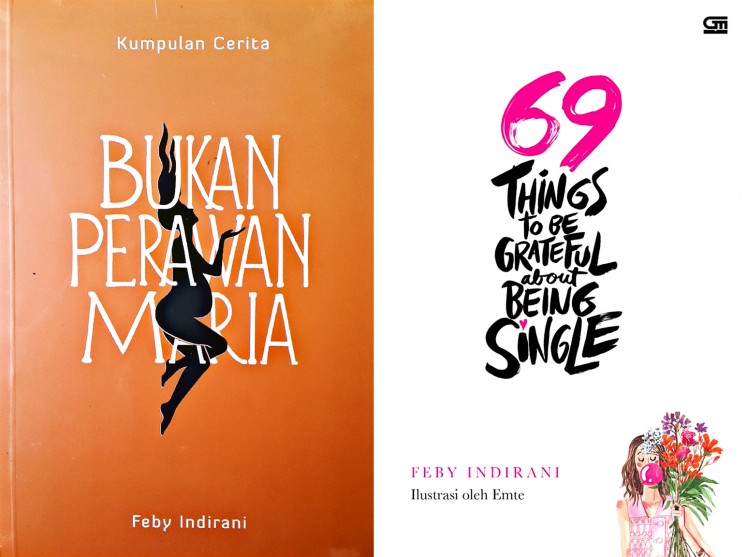Popular Reads
Top Results
Can't find what you're looking for?
View all search resultsPopular Reads
Top Results
Can't find what you're looking for?
View all search resultsFeby Indirani: Writing religious parodies
For this audacious author, fiction gives her room to tell more sensitive stories.
Change text size
Gift Premium Articles
to Anyone
M
ary is pregnant without ever having intercourse with a man. Without being married. Such a miracle happened when Jesus was born fatherless. Nowadays, who would believe that Mary was impregnated without having intercourse?
Those sentences appeared in the opening of a short story penned by Indonesian author Feby Indirani titled Bukan Perawan Maria (Not Virgin Mary). It was included in an eponymous short story anthology published by Pabrikultur last year.
Although many Indonesian writers, including poet/novelist Norman Erikson Pasaribu and poet Mario F. Lawi, have used religious iconography extensively in their works, no one has written parodies on religious issues in Indonesia.
Read Baby Ingin Masuk Islam (Baby wants to convert): “The council meeting turned into commotion upon hearing a message delivered by cleric Fikri on a pig named Baby who declares her wish to convert to Islam.”
The stories are indeed humorous, but some people perceive them as insulting. A major publishing company refused to publish the book.
“A printing company has also refused to print the book because its director perceives the book to be making fun of Islam,” Feby said.
Books by Feby Indirani, Bukan Perawan Maria (Not Virgin Mary) and 69 Things to be Grateful About Being Single. (Feby Indirani/File)Feby studied journalism at Padjadjaran University in Bandung, West Java. She has worked with Bloomberg Businessweek magazine, Tempo media group and Kompas TV. She took part in the Australia-Indonesia Muslim Exchange Program in 2006, winning journalism fellowships to Singapore and Germany in 2010.
“People who have read the stories keep asking me whether I’m afraid,” she said.
Intolerance and conservatism are rising as seen in the imprisonment of former Jakarta governor Basuki “Ahok” Tjahaja Purnama for blasphemy, and Feby is not immune to fear. She admitted that she was a little anxious, particularly during an exhibition marking the book launch last July at the Cipta gallery in Taman Ismail Marzuki cultural center in Central Jakarta.
“Before the exhibition, there was a strange woman wearing the full-face veil taking pictures from every corner of the room. She told the security guard that her son liked to paint pictures […]” she said.
Thankfully, everything was safe and sound during the exhibition, opened by Religious Affairs Minister Lukman Hakim Saefuddin.
There were noises in the virtual world, though. When online news outlets uploaded stories on the anthology’s launch, many people picked a fight with her online. “Somebody wrote: Perempuan kafir [infidel woman] in all caps. If I didn’t respond to the comments on social media, though, they would send me private messages,” she said.
Responses to her short story Rencana Pembunuhan Sang Muazin (Murder plot against the muezzin), uploaded on detik.com in July, however, were somewhat more toned down.
“The comments on the short stories were more civilized than comments on the news stories on my book launch,” she said.
Feby hypothesized that people treated fiction differently than news stories.
“Their fairytale logic starts to work, recognizing the story to be fictitious. It is also possible that fiction allows people to read between the lines, giving them time to grasp its content and ideas, putting a gap between stimulus and response,” she said.
Therefore, writing fiction could be a safer way to write about sensitive issues, according to Feby.
“During the New Order Era, writer Seno Gumira Ajidarma said: when journalism is gagged, literature must speak up. After the Reform Era, the New Order’s [military dictatorship] seems to have been replaced by Islamic fundamentalism,” she said.
Feby added that many people — Muslims and non-Muslims alike — actually thanked her for voicing their aspirations, as many people were actually concerned about religious intolerance in Indonesia but did not dare to speak up.
“People take religious intolerance for granted because they don’t want to fight,” she said. To illustrate this, she recounted an incident in which people were hesitant to walk over a sign that read: Salat Jum’at, dilarang melintas (Friday prayers in progress; you are prohibited from crossing) inside the gallery.
“Friday prayers were not happening and it was inside a gallery, for God’s sake,” she said.
“People have become helpless in dealing with road blocks during Friday prayers.”
The anthology is part of an initiative called Relaksasi Beragama (Relax; it’s just religion), organized by Feby and her publisher Pabrikultur. The initiative calls upon people to be more open-minded in dealing with people adhering to different religious interpretations.
“Contextually, this movement is very important at a time when we feel that religious life has hardened, especially when dealing with differences,” Lukman said while opening the exhibition in July.
Feby said both the extreme right and extreme left were immature.
“Mature thinking allows you to create distinctions instead of being trapped in black-or-white thinking,” she said.
Feby, who started to write literary works seriously in college, said that growing up in a religiously conservative family, she had always wanted to write about Islam. Among her favorite authors are Indian writers Jhumpa Lahiri and Arundhati Roy, Japanese writer Haruki Murakami as well as Pakistani writer Kamila Shamsie.
Feby jokes and laughs constantly while talking to The Jakarta Post, particularly when discussing her latest output called 69 Things to be Grateful About Being Single.
“When I was taking care of my passport, the immigration employee asked me, ‘you’re not married yet? Not married? It must be because you’re too busy with work,” she said, while laughing. Then she got serious. “This reflects Indonesia’s nasty single-shaming culture, particularly against women. This has given rise to numerous movements advocating polygamy and unregistered marriages. Therefore, I would like to present an alternative view: being single isn’t that bad.”












